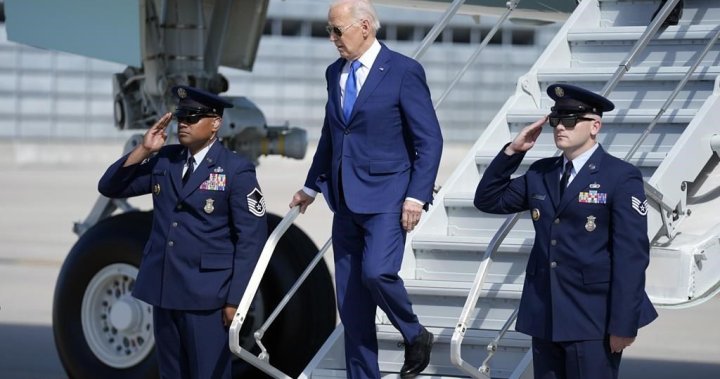U.S. President Joe Biden said Wednesday that he would not supply offensive weapons that Israel could use to launch an all-out assault on Rafah — the last major Hamas stronghold in Gaza — over concern for the well-being of the more than 1 million civilians sheltering there.
Biden, in an interview with CNN, said the U.S. was still committed to Israel’s defense and would supply Iron Dome rocket interceptors and other defensive arms, but that if Israel goes into Rafah, “we’re not going to supply the weapons and artillery shells used, that have been used.”
“I made it clear that if they go into Rafah — they haven’t gone in Rafah yet — if they go into Rafah, I’m not supplying the weapons that have been used historically to deal with Rafah, to deal with the cities, that deal with that problem,” Biden said.
The interview marked Biden’s toughest public comments yet about the potential Israeli military operation and followed his decision to pause a shipment of heavy 2,000-pound bombs to Israel last week over concerns that the U.S. ally was moving closer to an attack on Rafah, despite public and private warnings from his administration.
Biden also said the 2,000-pound bombs have been used to kill Palestinian civilians, his most stark public recognition yet of America’s role in the seven-month Israel-Hamas conflict.
“Civilians have been killed in Gaza as a consequence of those bombs and other ways in which they go after population centers,” he said in the interview.

Earlier Wednesday, Defense Secretary Lloyd Austin told a Senate committee that the Biden administration had paused the heavy bomb shipment over concerns about civilian safety in a potential Rafah offensive. He added that the administration was also reviewing some “near-term security assistance shipments” to Israel.
The email you need for the day’s
top news stories from Canada and around the world.
Austin was the first senior Biden administration official to publicly explain the pause, which was first reported last week.
“We’ve been very clear… from the very beginning that Israel shouldn’t launch a major attack into Rafah without accounting for and protecting the civilians that are in that battlespace,” Austin told the Senate hearing.
“And again, as we have assessed the situation, we have paused one shipment of high payload munitions,” he said. “We’ve not made a final determination on how to proceed with that shipment.”
The shift also comes as the Biden administration is due to deliver a first-of-its-kind formal verdict this week on whether the airstrikes on Gaza and restrictions on delivery of aid have violated international and U.S. humanitarian laws. A decision against Israel would further add to pressure on Biden to curb the flow of weapons and money to Israel’s military.
The U.S. has historically provided enormous amounts of military aid to Israel. That has only accelerated in the aftermath of Hamas’ Oct. 7 attack that killed some 1,200 in Israel and led to about 250 being taken captive by militants.
Israel’s campaign to destroy Hamas has led to a seven-month-long military campaign that has so far killed over 34,000 Palestinians, mostly civilians, the Hamas-run Gaza Health Ministry said.

Austin told the Senate hearing that Israel had to be more precise and the type of weapons used in a heavily populated area mattered.
A “small-diameter bomb, which is a precision weapon, it’s very useful in a dense, built-up environment… but maybe not so much a 2,000-pound bomb that could create a lot of collateral damage,” Austin said.
Israeli troops on Tuesday seized control of Gaza’s vital Rafah border crossing in what the White House described as a limited operation that stopped short of the full-on Israeli invasion of the city that Biden has repeatedly warned against on humanitarian grounds, most recently in a Monday call with Israeli Prime Minister Benjamin Netanyahu.
Israel has ordered the evacuation of 100,000 Palestinians from the city. Israeli forces have also carried out what it describes as “targeted strikes” on the eastern part of Rafah and captured the Rafah crossing, a critical conduit for the flow of humanitarian aid along the Gaza-Egypt border.
—With additional files from Reuters
© 2024 The Canadian Press










